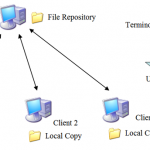Salesforce Administrator Salary and Job Outlook
Salesforce, a world-renowned customer relationship management (CRM) platform, stands as a true game-changer for businesses looking to streamline their operations, foster customer relationships, and stay competitive in the digital age. At the heart of every successful Salesforce implementation is a skilled and knowledgeable Salesforce Administrator.
Salesforce Administrators are the unsung heroes behind the scenes, working diligently to ensure that Salesforce CRM systems run smoothly, effectively, and efficiently. They play a vital role in customizing, configuring, and maintaining the Salesforce platform to meet an organization’s unique needs. But what makes this profession even more enticing is the promising Salesforce Administrator salary and job outlook.
In this blog post, we’ll dive deep into the world of Salesforce Administrators by obtaining a Salesforce course at CRS Info Solutions, shedding light on their crucial responsibilities, the qualifications they need, and most importantly, the compensation they can expect. We will explore the current salary trends, the factors influencing these salaries, and the job outlook for this dynamic and ever-evolving role.
Salesforce Administrator Job Description
Salesforce Administrators serve as the backbone of an organization’s Salesforce CRM implementation. Their role encompasses a wide range of responsibilities to ensure that the Salesforce platform aligns with the company’s goals and functions effectively. Some of the core duties include:
1. System Configuration:
Salesforce Administrators play a pivotal role in configuring the Salesforce platform to match the unique needs and processes of their organization. This involves tailoring the system to make it a perfect fit for the business. They create custom fields, design workflows, and implement processes that not only optimize the user experience but also enhance the system’s efficiency. By customizing Salesforce, they ensure that it aligns seamlessly with the way the company operates, allowing for smoother and more productive interactions with the CRM system.
2. User Management:
User management is a critical aspect of a Salesforce Administrator’s role. They are responsible for overseeing user accounts and defining roles, profiles, and permissions. This means ensuring that every user within the organization has the appropriate level of access to data and functionality, striking a balance between data security and user productivity. They establish user hierarchies, govern who can view, edit, or delete specific records, and ensure that the system adheres to data privacy regulations and company policies.
3. Data Management:
Salesforce Administrators take on the responsibility of maintaining a clean and accurate database. Data is the lifeblood of a CRM system, and administrators are tasked with upholding data quality. They monitor data integrity, resolve data inconsistencies, and implement protocols to prevent data duplication. Furthermore, they manage data import and export operations, ensuring that data flows smoothly between Salesforce and other systems, contributing to a more efficient and effective data ecosystem.
4. Customization:
Salesforce Administrators are the architects of the system’s design. They customize Salesforce objects, layouts, and record types to precisely match the unique requirements of their organization. By doing so, they enable seamless data entry, retrieval, and management. Customization is about tailoring the system so that it feels like a natural extension of the company’s operations, which, in turn, promotes user adoption and data accuracy.
5. Automation:
Automation is a significant time-saver and productivity booster in Salesforce. Administrators utilize automation tools like Workflow Rules and Process Builder to streamline repetitive tasks and business processes. They create automated workflows that trigger actions, such as sending emails, updating records, or assigning tasks, based on predefined criteria. Automation not only enhances efficiency but also reduces manual labor, enabling the team to focus on higher-value tasks.
6. Reports and Dashboards:
Salesforce Administrators are responsible for crafting and maintaining reports and dashboards that provide valuable insights and analytics to various stakeholders. These reports offer a window into the performance of sales, marketing, and customer service activities. Dashboards, on the other hand, provide real-time snapshots of key metrics, helping decision-makers make data-driven choices, spot trends, and identify areas for improvement.
7. Security and Compliance:
Data security and compliance are paramount in Salesforce Administration. Administrators establish and maintain security protocols, including role-based access control, field-level security, and sharing rules. They also set up audit trails to track changes made to data, ensuring transparency and accountability. Compliance with industry regulations, such as GDPR or HIPAA, is a central concern for Salesforce Administrators, and they work diligently to ensure data is handled in accordance with these regulations.
8. Integration:
Salesforce doesn’t operate in isolation. Administrators often engage in integrating Salesforce with other systems used by the organization. This may involve connecting with marketing automation tools, accounting software, or other databases. Integration ensures that data flows seamlessly between systems, minimizing manual data entry, reducing errors, and allowing for a more holistic view of customer interactions and business operations.
9. Support and Training:
Salesforce Administrators act as the first line of support for end-users. They troubleshoot issues, provide solutions, and address questions, ensuring that users can make the most of the platform. Additionally, they offer training and onboarding sessions for new users to help them effectively utilize Salesforce’s capabilities, further contributing to user adoption and system effectiveness.
Salesforce Administrator Salary Overview
Salesforce Administrators are in high demand, and their salaries reflect that. According to Glassdoor, the average salary for a Salesforce Administrator in the United States is $76,206 per year. However, salaries can vary depending on a number of factors, including experience, skills, location, and company size.
1. Experience
Salesforce Administrators with more experience tend to earn higher salaries. For example, entry-level Salesforce Administrators typically earn around $50,000 per year, while Salesforce Administrators with 5+ years of experience can earn upwards of $130,000 per year.
2. Skills
Salesforce Administrators with in-demand skills, such as experience with Salesforce Lightning, Salesforce Einstein, or Salesforce integrations, can also expect to earn higher salaries.
3. Location
Salesforce Administrators in major metropolitan areas, such as San Francisco, New York City, and Seattle, typically earn higher salaries than Salesforce Administrators in smaller cities and rural areas.
4. Company size
Salesforce Administrators at large companies with deep Salesforce deployments typically earn higher salaries than Salesforce Administrators at small companies with smaller Salesforce deployments.
Here is a breakdown of the average Salesforce Administrator salary by experience level in the United States:
| Experience level | Average Salesforce Administrator salary |
|---|---|
| Entry-level | $50,000 |
| 1-3 years of experience | $65,000 |
| 3-5 years of experience | $80,000 |
| 5+ years of experience | $130,000 |
Here is a breakdown of the average Salesforce Administrator salary by location in the United States:
| Location | Average Salesforce Administrator salary |
|---|---|
| San Francisco | $115,000 |
| New York City | $110,000 |
| Seattle | $105,000 |
| Austin | $100,000 |
| Chicago | $95,000 |
Here is a breakdown of the average Salesforce Administrator salary by company size in the United States:
| Company size | Average Salesforce Administrator salary |
|---|---|
| Large companies (1000+ employees) | $90,000 |
| Medium-sized companies (500-999 employees) | $85,000 |
| Small companies (100-499 employees) | $80,000 |
If you are interested in becoming a Salesforce Administrator, there are a number of things you can do to increase your earning potential.
First, make sure you have the necessary skills and experience. You can gain these skills by completing Salesforce online training, earning Salesforce certifications, and working on Salesforce projects.
CRS Info Solutions is especially known for its Salesforce training program, which is curated to guide students through the learning, certification, and job-hunting process of starting a Salesforce career. The program is taught by instructors with over ten years of experience working in the industry, and it provides students with the necessary knowledge, hands-on experience, and the right skill set to fast-track their jump into a career in Salesforce.
Second, network with other Salesforce Administrators and professionals. This can help you learn about new opportunities and get your foot in the door with potential employers.
Finally, stay up-to-date on the latest Salesforce trends and technologies. This will make you more valuable to potential employers and help you command a higher salary.
Job Outlook for Salesforce Administrators
The demand for skilled Salesforce Administrators continues to surge, mirroring the increasing adoption of Salesforce across diverse industries. With businesses recognizing the pivotal role of customer relationship management in driving growth and fostering meaningful customer interactions, the need for proficient Salesforce Administrators has become more critical than ever. According to industry reports, the demand for Salesforce-related roles, including Administrators, has witnessed a steady upward trajectory, indicating a sustained and robust market for these professionals.
As organizations strive to enhance customer experiences, streamline business processes, and leverage data-driven insights, the need for Salesforce Administrators remains a top priority. This demand extends across industries ranging from healthcare and finance to retail and manufacturing, underscoring the versatility and cross-sector applicability of Salesforce skills.
How the Role is Evolving with New Salesforce Updates
The role of a Salesforce Administrator is not static but rather dynamic, continually evolving to embrace new functionalities and features introduced by Salesforce. With each update and release, Salesforce brings forth enhanced capabilities, integrations, and tools that empower organizations to stay ahead of the curve in customer engagement and data management.
Modern Salesforce Administrators are expected to stay abreast of these updates and proactively incorporate them into their organization’s Salesforce instance. They need to grasp the potential implications of new features on existing workflows, business processes, and data management strategies. This necessitates a commitment to ongoing learning and professional development, ensuring that Salesforce Administrators remain at the forefront of innovation and best practices within the Salesforce ecosystem.
Opportunities for Career Advancement in the Salesforce Ecosystem
The Salesforce ecosystem offers a myriad of opportunities for career advancement, providing a rich and diverse landscape for professionals to explore and grow. As Salesforce Administrators gain experience and deepen their understanding of the platform, various avenues for career progression open up, including:
- Specialization: Administrators can choose to specialize in areas such as Salesforce integration, data analytics, or automation, leveraging their expertise to become subject matter experts in their chosen domain.
- Certifications and Expertise: Obtaining advanced certifications, such as Salesforce Certified Advanced Administrator or Salesforce Certified Technical Architect, can unlock higher-level roles and increased responsibilities within the Salesforce ecosystem.
- Management Roles: With an in-depth understanding of Salesforce operations and a track record of successful implementations, Administrators can transition into managerial positions, overseeing teams and projects related to Salesforce deployment and management.
- Consulting and Freelancing: Experienced Salesforce Administrators can venture into consultancy or freelancing, providing their expertise to multiple organizations and helping them optimize their Salesforce implementations.
Tips for Maximizing Your Salesforce Administrator Salary
Salesforce admin salaries are shaped by numerous factors. Project complexity & size, industry, geographical location, and skillset are just some of the variables that impact salary levels.
In addition, experience holds tremendous weight when it comes to determining a Salesforce administrator’s salary. Fortunately, there are many ways that you can increase your earning potential.
1. Get Certified
A Salesforce administrator is a key role in an organization. They are responsible for ensuring that the Salesforce platform runs smoothly and efficiently. They also provide support for end users by troubleshooting technical issues, facilitating training, and formulating strategies to improve customer relationships.
Achieving a Salesforce admin certification is not only a great way to demonstrate your knowledge of the platform, but it can also help you stand out in the job market. In addition, pursuing additional certifications can lead to more opportunities for career advancement.
In the Salesforce ecosystem, being certified can significantly impact your salary. It shows that you have a deep understanding of the platform and can offer creative solutions to solve problems. This will make you a valuable asset to your company. It will also enable you to move up the ranks and become a more senior Salesforce administrator.
2. Stay Up-to-Date on Technology
Salesforce is a robust, complex software platform that has a wide variety of functionality. In order to use it effectively, businesses need a skilled Salesforce Administrator to manage and customize the platform for their specific needs.
Often, a Salesforce admin will specialize in a particular aspect of the software – such as Marketing Cloud or Sales Cloud. Having a unique specialism can make you more valuable to a company because you can help them achieve their goals more efficiently.
Staying up to date on new technology is essential for Salesforce professionals if they want to maximize their earning potential. One way to do this is by joining a professional organization that produces publications about current tech trends and advancements in the industry. Another way is to form a network with like-minded individuals who regularly converse and share articles about new technology. This can be a great motivation for staying up-to-date and can hold you accountable for researching new topics and ideas.
3. Be a Team Player
Being a Salesforce administrator requires you to be a team player. The nuances of the platform and its integration with the business structure are constantly changing, so having an open mind is key to maintaining success. As a result, being a strong communicator is essential in communicating these changes to the team and the overall organization.
It’s also helpful for a Salesforce admin to be able to work outside the box and find unconventional solutions to problems. Being a resourceful person who is able to Google and follow threads of conversations can help them find answers and new resources quickly.
Lastly, it’s important for a Salesforce administrator to be a leader. Being able to proactively respond to change and identify new areas of improvement will allow you to stay ahead of the curve for your company and its users.
4. Ask for a Raise
If you feel that you’re underpaid, it is important to ask for a raise. However, it’s also important to make sure that you’re making a good case for why you deserve one. This can be done by collecting credible industry salary information that demonstrates that you are worth more than what your company is paying you.
It’s also important to remember that certain regions pay higher salaries than others. For instance, Salesforce Administrators who work in cities like New York or San Francisco can expect to make more than those working in other areas of the country.
In addition, the size of your company has a significant impact on your salary as a Salesforce administrator. In general, larger companies will pay more than smaller ones, but this isn’t always the case. The key is to find a company that values your skills and experience. If you do, then it is likely that you will be able to negotiate a good salary.
End Note
Salesforce, a powerhouse in the world of customer relationship management (CRM), has revolutionized the way businesses operate in the digital age. At the core of every successful Salesforce implementation is a dedicated and proficient Salesforce Administrator.
In a nutshell, Salesforce Administration offers a unique blend of technological expertise, business acumen, and career growth potential. Salesforce Administrators play a crucial role in empowering organizations to harness the full potential of their CRM systems, making them an indispensable asset in today’s competitive business landscape.








![3 Social Commerce Trends You Should Know [Infographic]](https://technofaq.org/wp-content/uploads/2018/04/january-13-2018-infographic-social-commerce-150x150.png)







